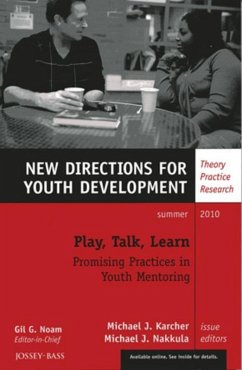This volume brings together the findings from separate studies ofcommunity-based and school-based mentoring to unpack the commonresponse to the question of what makes youth mentoring work. A debate that was alive in 2002, when the first NewDirections for Youth Development volume on mentoring,edited by Jean Rhodes, was published, centers on whethergoal-oriented or relationship-focused interactions (conversationsand activities) prove to be more essential for effective youthmentoring. The consensus appeared then to be that the mentoringcontext defined the answer: in workplace mentoring with teens, aninstrumental relationship was deemed essential and resulted inlarger impacts, while in the community setting, the developmentalrelationship was the key ingredient of change. Recent large-scale studies of school-based mentoring have raisedthis question once again and suggest that understanding howdevelopmental and instrumental relationship styles manifest throughgoal-directed and relational interactions is essential to effectivepractice. Because the contexts in which youth mentoring occurs (inthe community, in school during the day, or in a structured programafter school) affect what happens in the mentor-mentee pair, ourgoal was to bring together a diverse group of researchers todescribe the focus, purpose, and authorship of the mentoringinteractions that happen in these contexts in order to help mentorsand program staff better understand how youth mentoringrelationships can be effective. This is the 126th issue of New Directions for YouthDevelopment the Jossey-Bass quarterly report seriesdedicated to bringing together everyone concerned with helpingyoung people, including scholars, practitioners, and people fromdifferent disciplines and professions. The result is a uniqueresource presenting thoughtful, multi-faceted approaches to helpingour youth develop into responsible, stable, well-roundedcitizens.
Dieser Download kann aus rechtlichen Gründen nur mit Rechnungsadresse in A, B, BG, CY, CZ, D, DK, EW, E, FIN, F, GR, HR, H, IRL, I, LT, L, LR, M, NL, PL, P, R, S, SLO, SK ausgeliefert werden.









